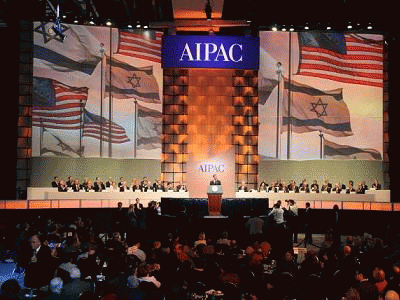Source: Palestine Chronicle
The American Israel Public Affairs Committee (AIPAC) annual conference begins on March 2 and will conclude with an address by Israeli Prime Minister Benjamin Netanyahu on March 4. The organizers boast that the meeting of "America's Pro-Israel Lobby" will attract "more than 14,000 pro-Israel Americans, more than two-thirds of Congress, [and] more than 2,200 students from 491 campuses."
There will be speeches by Senator John McCain and by Secretary of State John Kerry.
As part of the group's lobbying effort, the attendees will descend en masse on the Capitol Hill offices of Senators and Congressmen, delivering the message that AIPAC is alive and well in spite of some recent very public setbacks.
They will demand that the United States continue to pressure Iran with new sanctions even as the White House is searching for a way to avoid another potentially catastrophic war in the Middle East.
They will argue that Iran is a danger to the entire world and must be reduced to a level where it cannot even contemplate either offensive or retaliatory defensive action against Israel, to include the dismantling of its nuclear program and destruction of its ballistic missiles with a range exceeding 500 km.
AIPAC will claim record levels of fundraising and grassroots support. Indeed, its endowment totals $100m, its annual budget is nearly $70m and it has more than 200 employees, making it the most powerful and best funded foreign policy lobby in the US. But largely invisible amid the self-congratulating and lobbying process will be any sense of what the actual US vital interests might be vis-a-vis Israel.
The powerful Israel lobby, of which AIPAC is a part, has long argued that the foreign policy and security interests of Washington and Tel Aviv are identical, or to use the currently fashionable expressions, there is no space between the two and the US will always "have Israel's back."
A Tiny Client State
Washington's political class has wholeheartedly and uncritically adopted both the Israel-centric jargon and also Tel Aviv's skewed perceptions of Middle Eastern realities, producing the unique spectacle of a great global power doing everything possible to placate a tiny client state. Pandering to Israel will be on full display at the AIPAC conference.
But amid all the celebration AIPAC's leadership knows that it can no longer produce a napkin and have the signatures of 70 senators on it within a day. Nor does its steady flow of "information memos" sent to the legislature and the media command the same respect they once did.
Recent US engagement in Iraq, Libya, and Egypt, all supported by Israel and its supporters for various reasons, are increasingly being regarded as in no way beneficial to the US; quite the contrary.
AIPAC can no longer draft legislation favorable to Israel, send it over to Congress and expect a finished bill to emerge, passed with a unanimous vote. It has suffered major defeats through its open support for bombing Syria and for legislation increasing sanctions on Iran, the former opposed overwhelmingly by an aroused war-weary public and the latter stalled in a suddenly nervous Congress.
AIPAC also opposed the appointment of Chuck Hagel as Defense Secretary due to his alleged "anti-Israel record," though it did not do so openly and only lobbied the issue quietly on Capitol Hill. It was, nevertheless, a defeat.
Even The New York Times is taking note that AIPAC is now very much on the defensive, forcing it to respond to the Times commentary with an op-ed of its own defending its position on Iran, an uncharacteristic move for a group that is accustomed to operate in the shadows.
The rift has come about because reality and illusion have parted company. The reality is that the US cannot afford another war in the Middle East, either financially or in terms of the unintended consequences that wrecked the Iraqi and Afghan interventions.
(Note: You can view every article as one long page if you sign up as an Advocate Member, or higher).






